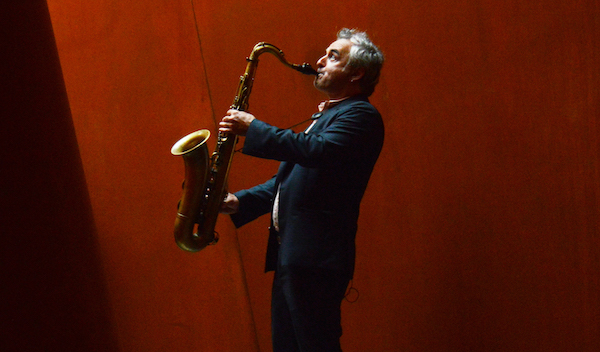Jan 13, 2026 2:09 PM
More Trump-Kennedy Center Cancellations
The fallout from the renaming of the John F. Kennedy Center for the Performing Arts to include President Donald…

Avram Fefer expands his trio by adding guitarist Marc Ribot.
(Photo: Robert I. Sutherland-Cohen)Saxophonist Avram Fefer is drawn to musicians who push the outer limits of what’s possible. Ornette Coleman, Wayne Shorter and Eric Dolphy are key influences for Fefer, who has worked with legends like the Last Poets, Archie Shepp and David Murray.
Born in San Francisco and raised in Washington State, Fefer currently is based in Brooklyn, having logged time with forward-looking ensembles like Adam Rudolph’s Go: Organic Orchestra and Burnt Sugar The Arkestra Chamber—and leads a trio with bassist Eric Revis and drummer Chad Taylor. That unit expands to a quartet with the addition of adventurous guitarist Marc Ribot on its new album, Testament (Clean Feed).
Fefer has a long history with his trio mates, having first performed with Taylor in the mid-’90s. The bandleader and Revis met around the turn of the century, performing occasionally at the Tap Bar in New York’s Knitting Factory.
Revis, a longtime member of the Branford Marsalis Quartet, reflected on their initial meeting: “I was really impressed by his honesty in playing and the tunes he was doing. From my perspective, having just got out of the Betty Carter gig and being part of the first wave of [players at] Smalls, I didn’t hear many cats dealing with Don Cherry tunes and such.”
The saxophonist has deep respect for the bassist’s style, describing it as “like a tree, where the roots go down so firmly that I can jump around, swinging on all the branches. His sound just gives you confidence—it’s all syrup and wood and strength, something very beautiful.”
The trio would go on to record a pair of albums, 2009’s Ritual and 2011’s Eliyahu, before parting ways. But in 2018, just as Fefer was ready to reunite them, an opportunity fell into his lap. He’d been playing at Brooklyn’s Bar LunÀtico, and had seen Ribot’s name on the schedule, too. “I wrote to Marc and said, ‘I have this date; do you want to do it?’” Fefer recalled. “He wrote back, ‘I’m not available that day, but if you ever want to record your material, I would love to do it.’”
Four of the songs on the new album—the title track, “Essaouira,” “Wishful Thinking” and Taylor’s “Song For Dyani”—are rerecordings from the trio’s earlier albums. The new versions are longer and looser, with fierce interplay between saxophone and guitar that occasionally recall Ribot’s 2005 album Spiritual Unity, an album on which he paid tribute to Albert Ayler.
For Testament, the ensemble had just one day to rehearse and another to record, which made Fefer a bit nervous going in. But when he listened back to the results, he was pleasantly shocked.
“There’s an edge-of-your-seat quality to the music, a bubbly effusive energy that they created,” Fefer said. “It’s like being in the middle of a storm and you don’t know what happened [until you listen] later.”
Revis has a theory about what makes the trio distinctive. “It’s been my experience that musicians who are prone to a more experimental way of approaching things often omit groove ... or at least put less emphasis on it,” he said. “With this group, all is relevant.” DB

Belá Fleck during an interview with Fredrika Whitfield on CNN.
Jan 13, 2026 2:09 PM
The fallout from the renaming of the John F. Kennedy Center for the Performing Arts to include President Donald…

Peplowski first came to prominence in legacy swing bands, including the final iteration of the Benny Goodman Orchestra, before beginning a solo career in the late 1980s.
Feb 3, 2026 12:10 AM
Ken Peplowski, a clarinetist and tenor saxophonist who straddled the worlds of traditional and modern jazz, died Feb. 2…

The success of Oregon’s first album, 1971’s Music Of Another Present Era, allowed Towner to establish a solo career.
Jan 19, 2026 5:02 PM
Ralph Towner, a guitarist and composer who blended multiple genres, including jazz — and throughout them all remained…

Rico’s Anti-Microbial Instrument Swab
Jan 19, 2026 2:48 PM
With this year’s NAMM Show right around the corner, we can look forward to plenty of new and innovative instruments…

Richie Beirach was particularly renowned for his approach to chromatic harmony, which he used to improvise reharmonizations of originals and standards.
Jan 27, 2026 11:19 AM
Richie Beirach, a pianist and composer who channeled a knowledge of modern classical music into his jazz practice,…